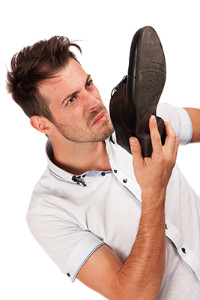
 If you begin to notice redness or dry, scaly skin around the toes, you may be suffering from Athlete’s foot. This possibility is heightened when accompanied by foul odor, which is a sign of both bacteria and fungus abrading the skin of your feet. Avoid touching the feet and then touching the rest of your body, as Athlete’s foot is communicable through contact. Moist environments should also be avoided, and be sure to wear shoes when at the gym locker room. Many over-the-counter medications are available to treat Athlete’s foot. To determine what is suitable for your case, however, it is best to consult with your podiatrist.
If you begin to notice redness or dry, scaly skin around the toes, you may be suffering from Athlete’s foot. This possibility is heightened when accompanied by foul odor, which is a sign of both bacteria and fungus abrading the skin of your feet. Avoid touching the feet and then touching the rest of your body, as Athlete’s foot is communicable through contact. Moist environments should also be avoided, and be sure to wear shoes when at the gym locker room. Many over-the-counter medications are available to treat Athlete’s foot. To determine what is suitable for your case, however, it is best to consult with your podiatrist.
Athlete’s foot is an inconvenient condition that can be easily reduced with the proper treatment. If you have any concerns about your feet and ankles, contact Dr. Alan J. Spector from Shore Podiatry. Our doctor will treat your foot and ankle needs.
Athlete’s Foot: The Sole Story
Athlete's foot, also known as tinea pedis, can be an extremely contagious foot infection. It is commonly contracted in public changing areas and bathrooms, dormitory style living quarters, around locker rooms and public swimming pools, or anywhere your feet often come into contact with other people.
Solutions to Combat Athlete’s Foot
Athlete’s foot can cause many irritating symptoms such as dry and flaking skin, itching, and redness. Some more severe symptoms can include bleeding and cracked skin, intense itching and burning, and even pain when walking. In the worst cases, Athlete’s foot can cause blistering as well. Speak to your podiatrist for a better understanding of the different causes of Athlete’s foot, as well as help in determining which treatment options are best for you.
If you have any questions please feel free to contact our office located in Point Pleasant, NJ . We offer the newest diagnostic and treatment technologies for all your foot and ankle needs.